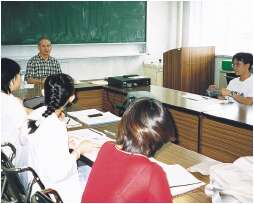

All the participating students came from the top universities in the Asia-Pacific region. The first year's program received 20 students from 8 universities: The Chinese University of Hong Kong, The University of Hong Kong, Ewha Womans University (Korea), Kyung Hee University (Korea), National University of Singapore, National Taiwan University, Rice University (U.S.A.), and Amherst College (U.S.A.)
This summer program offered two tracks of study to participating students: Social & Cultural Sciences and Natural Sciences. Students were able to apply for either of the tracks according to their interest or major. Japanese Language Courses are common part of the program. All students took both Japanese language course and other courses in each track.
Part of the program's attractiveness was the Asian Studies Courses (ASC) offered in the Social & Cultural Science track. Staring at globalization, which has been rapidly advancing in Asia, the ASC was designed to offer the valuable opportunities for the participating students, promising young leaders, to study international relationships not only between Japan and the Asia, but also between Asia and the world. All the courses were lectured by eminent professors invited from universities in Singapore, U.S.A. and U.K, who have been studying and educating in the field of Asian studies.It was a valuable asset of the program that the students were able to know about the Asia viewed from other part of the world, and about Japan viewed from overseas countries. Three courses of the ASC were open to Kyushu University students as an intensive course.
Information Technology was another distinctive feature of the ASC. Lecturers used the Internet and audio-visual teaching materials in their classes, and thus the ASC presented the latest teaching methods keeping up with an era of Information Technology.
Laboratory Work Course (LWC) was designed for the students of Natural Sciences track. This year, 4 students attended the LWC in Psychology, Pharmaceutical Sciences and Tumor Control Medicine. They took part in research activities at each laboratory under guidance of a Kyushu University professor.
Acknowledging that Japanese language is a major interest of international students coming to Japan, the Japanese Language Course (JLC) of the summer program was designed to accommodate students of diverse levels of Japanese language skill and satisfy students' needs. All the classes were taught with close attention to the students.
| Asian Studies Courses |
| Understanding Contemporary Japan in the Global Age |
| - Prof. Takamichi Mito, A/Prof. Andrew Cobbing (Kyushu University) |
| Globalization in China |
| - Prof. Steven Lewis (Rice University, U.S.A.) |
| The Foreign in Japan's Self-Image |
| - Prof. Noel J. Pinnington (University of Arizona, U.S.A.) |
| Japan ---- the Real, Japan ---- the Imaginal |
| - Prof. Patrick Caddeau (Amherst College, U.S.A) |
| Japan and the Asia-Pacific in Modern Times |
| - Prof. See-Heng Teow (National University of Singapore) |
| Premodern China in Global Perspective |
| - Prof. Richard J. Smith (Rice University, U.S.A.) |
| Government and Politics in Japan |
| - Prof. Ian Neary (University of Essex, U.K.) |
 | Name | Hye Sun Han |
| University | Ewha Womans University, Senior | |
| Major | Economics/Professional English | |
| At first, when I heard of the UMAP program from my home university, I felt it would satisfy my interests on "something international." Through the UMAP program, 20 students from five countries gathered at Kyushu University and have shared each other's unique experiences. My first impression of Fukuoka was that people are very kind to foreigners. No wonder that Fukuoka is called a "foreigner-friendly city." Even though Japanese culture is very different from Korean culture, and it is my first visit to Japan, I feel at ease with the Japanese life style. I hope many students of Kyushu University are also able to have this kind of international experience. This program allowed me to realize myself as a student of the world, not just as a student of Korea. | ||